Newsweek has been bombarded with mass emails from conservative churches who were outraged by this article. To send your message of support, see this page on the Human Rights Campaign website.
The debate over scriptural views of homosexuality makes many people afraid that they will have to choose between their faith and their relationships. Conservative friends have told me that I am cutting myself off from the orthodox Christian community by attending an inclusive church. Meanwhile, some in that church are skittish about its historic doctrines, afraid that tradition cannot be disentangled from a legacy of institutional oppression.
Fortunately, I’m not the only one who hasn’t given up hopes of an inclusive orthodoxy. Newsweek ran a brave and controversial cover story last week: Our Mutual Joy: The Religious Case for Gay Marriage, by Lisa Miller. Highlights:
In the Old Testament, the concept of family is fundamental, but examples of what social conservatives would call “the traditional family” are scarcely to be found. Marriage was critical to the passing along of tradition and history, as well as to maintaining the Jews’ precious and fragile monotheism. But as the Barnard University Bible scholar Alan Segal puts it, the arrangement was between “one man and as many women as he could pay for.” Social conservatives point to Adam and Eve as evidence for their one man, one woman argument—in particular, this verse from Genesis: “Therefore shall a man leave his mother and father, and shall cleave unto his wife, and they shall be one flesh.” But as Segal says, if you believe that the Bible was written by men and not handed down in its leather bindings by God, then that verse was written by people for whom polygamy was the way of the world. (The fact that homosexual couples cannot procreate has also been raised as a biblical objection, for didn’t God say, “Be fruitful and multiply”? But the Bible authors could never have imagined the brave new world of international adoption and assisted reproductive technology—and besides, heterosexuals who are infertile or past the age of reproducing get married all the time.)
Ozzie and Harriet are nowhere in the New Testament either. The biblical Jesus was—in spite of recent efforts of novelists to paint him otherwise—emphatically unmarried. He preached a radical kind of family, a caring community of believers, whose bond in God superseded all blood ties. Leave your families and follow me, Jesus says in the gospels. There will be no marriage in heaven, he says in Matthew. Jesus never mentions homosexuality, but he roundly condemns divorce (leaving a loophole in some cases for the husbands of unfaithful women).
The apostle Paul echoed the Christian Lord’s lack of interest in matters of the flesh. For him, celibacy was the Christian ideal, but family stability was the best alternative. Marry if you must, he told his audiences, but do not get divorced. “To the married I give this command (not I, but the Lord): a wife must not separate from her husband.” It probably goes without saying that the phrase “gay marriage” does not appear in the Bible at all.
If the bible doesn’t give abundant examples of traditional marriage, then what are the gay-marriage opponents really exercised about? Well, homosexuality, of course—specifically sex between men. Sex between women has never, even in biblical times, raised as much ire. In its entry on “Homosexual Practices,” the Anchor Bible Dictionary notes that nowhere in the Bible do its authors refer to sex between women, “possibly because it did not result in true physical ‘union’ (by male entry).” The Bible does condemn gay male sex in a handful of passages. Twice Leviticus refers to sex between men as “an abomination” (King James version), but these are throwaway lines in a peculiar text given over to codes for living in the ancient Jewish world, a text that devotes verse after verse to treatments for leprosy, cleanliness rituals for menstruating women and the correct way to sacrifice a goat—or a lamb or a turtle dove. Most of us no longer heed Leviticus on haircuts or blood sacrifices; our modern understanding of the world has surpassed its prescriptions. Why would we regard its condemnation of homosexuality with more seriousness than we regard its advice, which is far lengthier, on the best price to pay for a slave?
Paul was tough on homosexuality, though recently progressive scholars have argued that his condemnation of men who “were inflamed with lust for one another” (which he calls “a perversion”) is really a critique of the worst kind of wickedness: self-delusion, violence, promiscuity and debauchery. In his book “The Arrogance of Nations,” the scholar Neil Elliott argues that Paul is referring in this famous passage to the depravity of the Roman emperors, the craven habits of Nero and Caligula, a reference his audience would have grasped instantly. “Paul is not talking about what we call homosexuality at all,” Elliott says. “He’s talking about a certain group of people who have done everything in this list. We’re not dealing with anything like gay love or gay marriage. We’re talking about really, really violent people who meet their end and are judged by God.” In any case, one might add, Paul argued more strenuously against divorce—and at least half of the Christians in America disregard that teaching.
Religious objections to gay marriage are rooted not in the Bible at all, then, but in custom and tradition (and, to talk turkey for a minute, a personal discomfort with gay sex that transcends theological argument). Common prayers and rituals reflect our common practice: the Episcopal Book of Common Prayer describes the participants in a marriage as “the man and the woman.” But common practice changes—and for the better, as the Rev. Martin Luther King Jr. said, “The arc of history is long, but it bends toward justice.” The Bible endorses slavery, a practice that Americans now universally consider shameful and barbaric. It recommends the death penalty for adulterers (and in Leviticus, for men who have sex with men, for that matter). It provides conceptual shelter for anti-Semites. A mature view of scriptural authority requires us, as we have in the past, to move beyond literalism. The Bible was written for a world so unlike our own, it’s impossible to apply its rules, at face value, to ours.
Marriage, specifically, has evolved so as to be unrecognizable to the wives of Abraham and Jacob. Monogamy became the norm in the Christian world in the sixth century; husbands’ frequent enjoyment of mistresses and prostitutes became taboo by the beginning of the 20th. (In the NEWSWEEK POLL, 55 percent of respondents said that married heterosexuals who have sex with someone other than their spouses are more morally objectionable than a gay couple in a committed sexual relationship.) By the mid-19th century, U.S. courts were siding with wives who were the victims of domestic violence, and by the 1970s most states had gotten rid of their “head and master” laws, which gave husbands the right to decide where a family would live and whether a wife would be able to take a job. Today’s vision of marriage as a union of equal partners, joined in a relationship both romantic and pragmatic, is, by very recent standards, radical, says Stephanie Coontz, author of “Marriage, a History.”…
…We cannot look to the Bible as a marriage manual, but we can read it for universal truths as we struggle toward a more just future. The Bible offers inspiration and warning on the subjects of love, marriage, family and community. It speaks eloquently of the crucial role of families in a fair society and the risks we incur to ourselves and our children should we cease trying to bind ourselves together in loving pairs. Gay men like to point to the story of passionate King David and his friend Jonathan, with whom he was “one spirit” and whom he “loved as he loved himself.” Conservatives say this is a story about a platonic friendship, but it is also a story about two men who stand up for each other in turbulent times, through violent war and the disapproval of a powerful parent…
…In addition to its praise of friendship and its condemnation of divorce, the Bible gives many examples of marriages that defy convention yet benefit the greater community. The Torah discouraged the ancient Hebrews from marrying outside the tribe, yet Moses himself is married to a foreigner, Zipporah. Queen Esther is married to a non-Jew and, according to legend, saves the Jewish people. Rabbi Arthur Waskow, of the Shalom Center in Philadelphia, believes that Judaism thrives through diversity and inclusion. “I don’t think Judaism should or ought to want to leave any portion of the human population outside the religious process,” he says. “We should not want to leave [homosexuals] outside the sacred tent.” The marriage of Joseph and Mary is also unorthodox (to say the least), a case of an unconventional a
rrangement accepted by society for the common good. The boy needed two human parents, after all.
In the Christian story, the message of acceptance for all is codified. Jesus reaches out to everyone, especially those on the margins, and brings the whole Christian community into his embrace. The Rev. James Martin, a Jesuit priest and author, cites the story of Jesus revealing himself to the woman at the well— no matter that she had five former husbands and a current boyfriend—as evidence of Christ’s all-encompassing love. The great Bible scholar Walter Brueggemann, emeritus professor at Columbia Theological Seminary, quotes the apostle Paul when he looks for biblical support of gay marriage: “There is neither Greek nor Jew, slave nor free, male nor female, for you are all one in Jesus Christ.” The religious argument for gay marriage, he adds, “is not generally made with reference to particular texts, but with the general conviction that the Bible is bent toward inclusiveness.”
The practice of inclusion, even in defiance of social convention, the reaching out to outcasts, the emphasis on togetherness and community over and against chaos, depravity, indifference—all these biblical values argue for gay marriage. If one is for racial equality and the common nature of humanity, then the values of stability, monogamy and family necessarily follow. Terry Davis is the pastor of First Presbyterian Church in Hartford, Conn., and has been presiding over “holy unions” since 1992. “I’m against promiscuity—love ought to be expressed in committed relationships, not through casual sex, and I think the church should recognize the validity of committed same-sex relationships,” he says.
Still, very few Jewish or Christian denominations do officially endorse gay marriage, even in the states where it is legal. The practice varies by region, by church or synagogue, even by cleric. More progressive denominations—the United Church of Christ, for example—have agreed to support gay marriage. Other denominations and dioceses will do “holy union” or “blessing” ceremonies, but shy away from the word “marriage” because it is politically explosive. So the frustrating, semantic question remains: should gay people be married in the same, sacramental sense that straight people are? I would argue that they should. If we are all God’s children, made in his likeness and image, then to deny access to any sacrament based on sexuality is exactly the same thing as denying it based on skin color—and no serious (or even semiserious) person would argue that. People get married “for their mutual joy,” explains the Rev. Chloe Breyer, executive director of the Interfaith Center in New York, quoting the Episcopal marriage ceremony. That’s what religious people do: care for each other in spite of difficulty, she adds. In marriage, couples grow closer to God: “Being with one another in community is how you love God. That’s what marriage is about.”
I commend Newsweek for their courage and thoroughness in giving a voice to inclusive interpretations of scripture. But frankly, I’m getting fed up with trying to prove that “hey, we’re Christians too!” The Biblical analysis above won’t convince everyone that this is the only legitimate way to read the verses referring to same-sex intercourse–because it isn’t. It is, however, a legitimate reading. Can we all just move on now?
Most Bible passages admit of several interpretations if they are talking about anything remotely interesting. Christians can spin out book-length arguments for and against infant baptism; the Eucharist as Real Presence or symbol; six-day Creation; the timing of the apocalypse; free will versus predestination; pacifism versus just-war theory; whether Jesus was a communist; and on and on.
These are important issues, affecting many more people than the 10% of the population who are homosexual. We may not be able to gather all views under a single denominational umbrella. Yet somehow Arminians manage to recognize that Calvinists are still Christians. Baptists acknowledge Catholics’ sincere discipleship, even if they don’t take communion together.
But dare to suggest that there’s more than one way to read a half-dozen little verses about same-sex intimacy, and your obedience to God and Scripture is immediately called into question. You’re not just wrong, you’re disobedient. You don’t belong to the body of Christ. There can’t be any evidence of the Holy Spirit in your life.
I’d like to know why the burden of proof is on us to show that these verses should be narrowly construed, rather than on anti-gay Christians to justify their preference for laying the heaviest possible burden on an outcast minority. Why does it seem like they’re actively looking for arguments to maintain the status quo? Shouldn’t our choice of hermeneutic be driven by love and charity?
For all my fellow queer families out there: We can’t wait around for permission to believe that God’s grace belongs to us equally. We have to claim it for ourselves, within ourselves. Yes, “be prepared to give a reason for the hope that is in you.” But remember that we’re the body of Christ now, and no one can take that away from us.
Category Archives: Faith and Doubt
Resources for World AIDS Day
Today, Dec. 1, is the 20th anniversary of World AIDS Day, an international day of awareness about AIDS prevention and treatment. Here’s a small sampling of resources I’ve found worthy of attention:
Mthatha Mission
Jesse Zink, a graduate of our church’s youth program, is serving as a missionary with the Episcopal Church’s Young Adult Service Corps. He’s currently stationed at the Itipini Clinic in Mthatha, one of the poorest villages in South Africa, where he cares for HIV patients and their families. His stories from the front lines are filled with warmth, humor, sadness, and awareness of global inequalities.
Partners In Health
Before Paul Farmer started his free clinic for HIV and tuberculosis patients in Haiti, world health organizations wrote off these desperately poor areas as presenting problems too intractable for aid workers to solve. Farmer’s revolutionary model is based on hands-on involvement in patients’ lives, addressing not only their medical needs but the economic and social injustices that are the underlying cause of their plight. Their website says, “Our mission is to provide a preferential option for the poor in health care.” Tracy Kidder’s book Mountains Beyond Mountains is an excellent introduction to PIH’s history and worldwide achievements.
Jesus in Love
Armando Lopez’ painting “El Martir”, a reinterpretation of St. Sebastian, is posted at Jesus in Love, Kittredge Cherry’s always-provocative website exploring queer spirituality and the arts.
MSNBC’s Keith Olbermann Speaks Out Against Prop 8
This may be the most moving speech for equal marriage rights I’ve ever heard. Olbermann, a straight ally, sounded like he was on the verge of tears several times.
An excerpt from the transcript:
I keep hearing this term “re-defining” marriage. If this country hadn’t re-defined marriage, black people still couldn’t marry white people. Sixteen states had laws on the books which made that illegal in 1967. 1967.
The parents of the President-Elect of the United States couldn’t have married in nearly one third of the states of the country their son grew up to lead. But it’s worse than that. If this country had not “re-defined” marriage, some black people still couldn’t marry black people. It is one of the most overlooked and cruelest parts of our sad story of slavery. Marriages were not legally recognized, if the people were slaves. Since slaves were property, they could not legally be husband and wife, or mother and child. Their marriage vows were different: not “Until Death, Do You Part,” but “Until Death or Distance, Do You Part.” Marriages among slaves were not legally recognized.
You know, just like marriages today in California are not legally recognized, if the people are gay.
And uncountable in our history are the number of men and women, forced by society into marrying the opposite sex, in sham marriages, or marriages of convenience, or just marriages of not knowing, centuries of men and women who have lived their lives in shame and unhappiness, and who have, through a lie to themselves or others, broken countless other lives, of spouses and children, all because we said a man couldn’t marry another man, or a woman couldn’t marry another woman. The sanctity of marriage.
How many marriages like that have there been and how on earth do they increase the “sanctity” of marriage rather than render the term, meaningless?
What is this, to you? Nobody is asking you to embrace their expression of love. But don’t you, as human beings, have to embrace… that love? The world is barren enough.
It is stacked against love, and against hope, and against those very few and precious emotions that enable us to go forward. Your marriage only stands a 50-50 chance of lasting, no matter how much you feel and how hard you work.
And here are people overjoyed at the prospect of just that chance, and that work, just for the hope of having that feeling. With so much hate in the world, with so much meaningless division, and people pitted against people for no good reason, this is what your religion tells you to do? With your experience of life and this world and all its sadnesses, this is what your conscience tells you to do?
With your knowledge that life, with endless vigor, seems to tilt the playing field on which we all live, in favor of unhappiness and hate… this is what your heart tells you to do? You want to sanctify marriage? You want to honor your God and the universal love you believe he represents? Then Spread happiness—this tiny, symbolic, semantical grain of happiness—share it with all those who seek it. Quote me anything from your religious leader or book of choice telling you to stand against this. And then tell me how you can believe both that statement and another statement, another one which reads only “do unto others as you would have them do unto you.”
Read the entire transcript here.
Hundreds Attend “Join the Impact” Gay Marriage Rally in Northampton
Supporters of equal marriage rights held nationwide rallies yesterday, a grass-roots effort organized by the social networking group Join the Impact. Northampton’s event was coordinated by Kate Martini, whom you can see below in the video (blonde hair, red sweater). She did a wonderful job selecting a diverse group of speakers, gay and straight, who spoke from the heart about how the denial of anyone’s civil rights affects us all. It was my privilege to be one of them.
Upbeat, empowering entertainment was provided by the rainbow-clad Raging Grannies, the OffBeat women’s drumming circle, and the Amherst Unitarian Universalist choir. The Daily Hampshire Gazette newspaper estimated that 500 people attended.
Below are some photos from yesterday’s event. If you attended this rally, or a Join the Impact rally in another city, you’re encouraged to upload your pictures and videos to the Join the Impact website.
Signs of the times: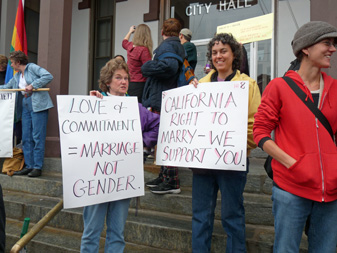
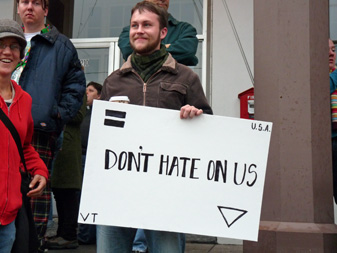
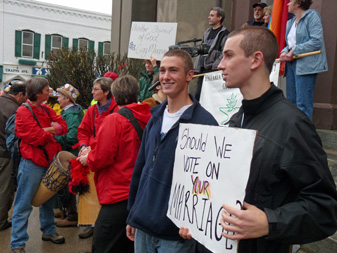
This is the Justice of the Peace who performed the first same-sex weddings in Northampton after gay marriage was legalized in 2004: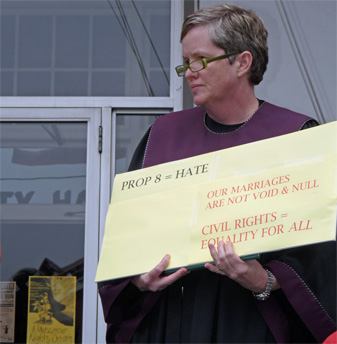
Our first speaker, Lorelei Erisis: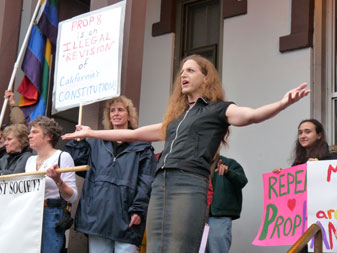
Shannon Weber (in the middle) is a Mt. Holyoke student who married her wife (on the right) in California earlier this year: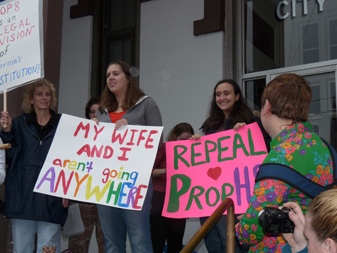
Rev. Heath, a hospice chaplain, speaks about how her faith in a loving God inspires her support for equal rights:
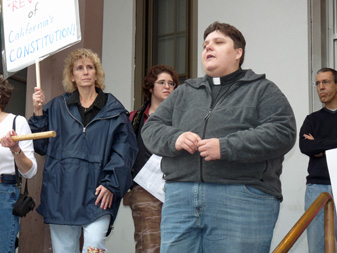
Telling the story of my queer family:
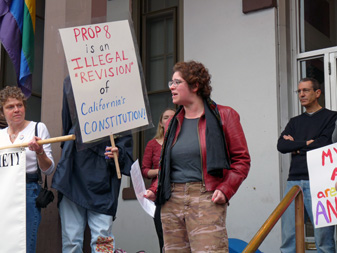
Our local activist choir:
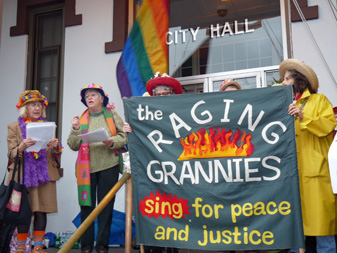
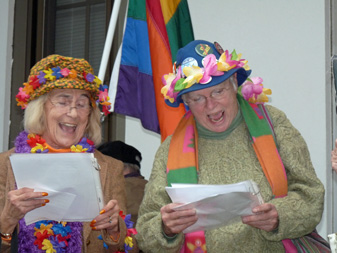
The OffBeat drummers start a rousing chant for justice (that’s me waving the pride flag in the background):
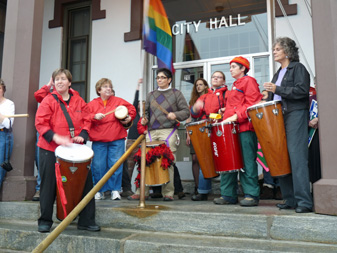
The Amherst UU’s lead us in the Holly Near song, “We Are a Gentle, Angry People”:
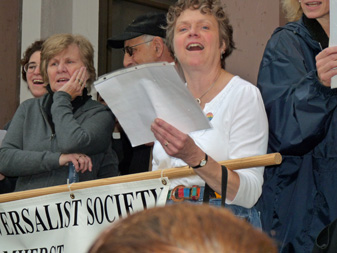
The Rev. Tinker Donnelly from the Unity Church in Greenfield:
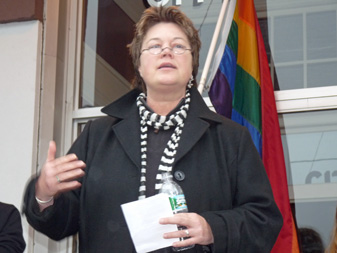
Our local MassEquality organizer, Jack Hornor:
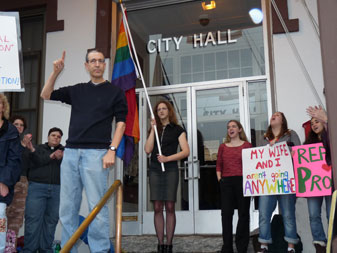
Kate closes the rally with a joyful chorus of “Yes We Can!”
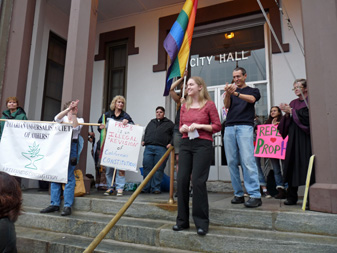
Prop 8 Post-Mortem: Knowing the Other
In a recent email newsletter to members, Human Rights Campaign President Joe Solmonese shared his thoughts about Proposition 8, the anti-gay-marriage ballot measure that narrowly passed this week in California:
Fifty-two percent of the voters of California voted to deny us our equality on Tuesday, but they did not vote our families or the power of our love out of existence; they did not vote us away. As free and equal human beings, we were born with the right to equal families. The courts did not give us this right—they simply recognized it. And although California has ceased to grant us marriage licenses, our rights are not subject to anyone’s approval. We will keep fighting for them. They are as real and as enduring as the love that moves us to form families in the first place. There are many roads to marriage equality, and no single roadblock will prevent us from ultimately getting there.
And yet there is no denying, as we pick ourselves up after losing this most recent, hard-fought battle, that we’ve been injured, many of us by neighbors who claim to respect us.
By the same token, we know that we are moving in the right direction. In 2000, California voters passed Proposition 22 by a margin of 61.4% to 38.6%. On Tuesday, fully 48% of Californians rejected Proposition 8. It wasn’t enough, but it was a massive shift. Nationally, although two other anti-marriage ballot measures won, Connecticut defeated an effort to hold a constitutional convention ending marriage, New York’s state legislature gained the seats necessary to consider a marriage law, and FMA architect Marilyn Musgrave lost her seat in Congress. We also elected a president who supports protecting the entire community from discrimination and who opposes discriminatory amendments….
But even before we do the hard work of deconstructing this campaign and readying for the future, it’s clear to me that our continuing mandate is to show our neighbors who we are.
Justice Lewis Powell was the swing vote in Bowers, the case that upheld Georgia’s sodomy law and that was reversed by Lawrence v. Texas five years ago. When Bowers was pending, Powell told one of his clerks “I don’t believe I’ve ever met a homosexual.” Ironically, that clerk was gay, and had never come out to the Justice. A decade later, Powell admitted his vote to uphold Georgia’s sodomy law was a mistake.
Everything we’ve learned points to one simple fact: people who know us are more likely to support our equality.
In recent years, I’ve been delivering this positive message: tell your story. Share who you are. And in fact, as our families become more familiar, support for us increases. But make no mistake: I do not think we have to audition for equality. Rather, I believe that each and every one of us who has been hurt by this hateful ballot measure, and each and every one of us who is still fighting to be equal, has to confront the neighbors who hurt us. We have to say to the man with the Yes on 8 sign—you disrespected my humanity, and I am not giving you a pass. I am not giving you a pass for explaining that you tolerate me, while at the same time denying that my family has a right to exist. I do not give you permission to say you have me as a “gay friend” when you cast a vote against my family, and my rights.
Perhaps Jesus spent so much time with social outcasts, not only healing them but allowing them to minister to him with hospitality and loving touch, to model a pattern of life that benefits us even more than “the other” to whom we reach out. Segregation stifles our moral imagination. If everyone close to you is a Christian, maybe it’s easier for you to compartmentalize the idea of eternal hellfire for the unsaved, to write off their torment as necessary sacrifices to the consistency of your idea of God. Similarly, if openly gay families are not welcome in your church, you’ll never see the facts that contradict the lies you’ve learned, the stereotypes about how their love and faith are not as genuine as yours.
To borrow from the language of law, it’s interesting to ask why certain stories in the Bible are taken as universal precedents, while the application of others is strictly limited to their facts. For instance, Catholics and some conservative Protestants believe that Jesus’ maleness is a relevant trait that should be required of all ministers who stand in his stead. None of them, as far as I know, have argued that priests should all be under 33, trained in carpentry, Middle Eastern, or of Jewish descent, though these traits–equally unrelated to one’s personal gifts for the ministry–would have been viewed by his own culture as important determinants of his identity. Gender essentialism is a presupposition we bring to the Bible, not a doctrine compelled by its pages.
Similarly, ambiguous “dicta”, so to speak, about pagan sexual practices in verses like Romans 1:27 are applied to today’s same-sex marriages in a way that brooks no disagreement, no openness to information about the character of those relationships then and now. Meanwhile, the “holding” of the story of Peter and Cornelius in Acts 10 somehow never gets applied by those who believe change is the enemy of Biblical authority rather than a fundamental part of the Bible’s storyline. Of course Peter had to eat with a Gentile, they might say. That was about the Jewish law being superseded–by us. That could never happen to us and the groups we believe are outside our holiness code.
If you have no idea what I was just talking about, this Torts outline from Chicago-Kent College of Law may help:
Qualifications to Stare Decisis
1. Holding v. Dictum. A court is not bound by the words used in a prior decision, nor all of the reasoning used; it is only bound by the legal principle or principles that were necessary for the previous court to reach the decision it reached….i.e., the new case is only bound by the HOLDING or RATIO DECIDENDI of the former decision.
2. The previous opinion may have talked about many things not necessary to the outcome. Such a statement is classified as DICTUM (or if more than one, DICTA)(sometimes OBITER DICTUM).
Why aren’t these binding? We have an adversary system. That principle of law was not argued by the litigants in the previous case, and not fully weighed by the court in deciding the previous case. Often, they are merely opinions of the court, and will not be applied in a case where the issue clearly is presented and fully argued.
So, when reading any decision, whether in a substantive course or for legal writing research paper, it is very important that you identify the exact holding of the case, and what is merely dicta.
3. The prior decision is binding only if the facts in the subsequent case are the same, or substantially the same, as in the previous case — i.e. if they are fully analogous.
If there are significant differences, the previous case may be “distinguished”, or are “disanalogous,” and will not be binding on the subsequent case.
That is not to say that the new case cannot reach the same conclusion, but the court in the new case is not required to follow the previous case. It may now extend that case’s reasoning to include the new case. On the other hand, it may conclude that the new facts are significantly different and require a different conclusion.
Perhaps all would-be theologians should go to law school…
A Historic, Bittersweet Election Day
In 16 years of voting, I’ve never been so happy to draw that little line on the ballot as when I connected the arrow yesterday for Obama-Biden. Whatever the outcome would be, I felt an unprecedented hope for our country, merely because of the chance to vote for a candidate I believed in. Obama’s acceptance speech epitomized the qualities I admire about him: idealism and passion for justice, tempered by an intelligent and realistic assessment of how complex our problems are. Whatever stresses and slanders are thrown at him, he seems to meet them with uncanny equanimity. That quality, perhaps more than any other, has lately strengthened me by example.
I call this election bittersweet because voters in California narrowly passed Proposition 8, which would amend the state constitution to take away same-sex marriage rights. Florida passed a similar measure, while Arkansas voted to ban adoptions by gay couples.
Imagine waking up this morning and learning that the people of your state had voted to break up your family. Without ever meeting you, they’d taken it upon themselves to decide that your love wasn’t real love, and your children didn’t belong to you. Church leaders had persuaded your neighbors and your family that God abhorred your intimate relationships–maybe even sowed a terrible doubt in your mind. This breaks my heart most of all. Worldly governments only have lordship over our bodies, but you’re better off killing a man than coming between him and his God.
Before the Civil War, African-American families were torn apart by white slave-owners who believed their marriages weren’t real. No more than a generation or two ago, our courts and legislatures were still debating whether race should remain a barrier to employment, education, housing, and the right to marry the man or woman of one’s choice. Now we have an African-American president. While racism still afflicts us, think how the terms of the debate have already shifted, beyond the imaginings of people who grew up in the civil rights era. Social change does happen, though it feels painfully slow to those whose basic rights are still in jeopardy. Take a deep breath, look back at history, look forward in faith.
Some Readings for All Saints’ Day
Today, Nov. 1, is All Saints’ Day in the church calendar, otherwise known as the day after Halloween (All Hallows’ Eve). We saw only a handful of trick-or-treaters last night, but this morning the large container of leftover Mounds and Milky Way minis on our porch had been completely emptied by hungry teenagers or very neat raccoons. If you’d stopped by, you would have seen my husband eating a nutritious dinner of microwave popcorn and bananas while I read to him from Ariana Reines’ new poetry book, Coeur de Lion. (“But the planet, what is it/That assholes speak of saving it/Like they speak of saving Africa/By shopping. Saved./Saved. An agate marble/At the bottom of a toilet.”)
Coeur de Lion is mainly about Ariana’s short-lived affair with a rather banal person named Jake. She is aware that neither the animal heat and messiness of their sex, nor the desperate pretensions of their literary exchanges, really elevate this affair to a grand passion, yet she feels awful nonetheless. She writes candidly about the slippage between the actual and the literary self, using humor as a means to sincerity rather than an evasion of it. However, sometimes the flatness of her mock-Internet-speak grows tiresome, creating an immature voice that doesn’t do justice to the brilliance of her thoughts.
Reines’ first book, The Cow, is so stupefyingly wonderful that I have not yet been able to blog about it. To say that Coeur de Lion is not as good as The Cow is like saying that it is not as good as Shakespeare. Well, of course not.
The Cow restored my sanity last January, or rather gave me permission to go beyond reason, to give unselfconsious voice to what made me insane. Reines bursts out of linear thought patterns and explicable metaphors because she is saying the unsayable, not in the usual anguished self-referential modernist way, but in full surrender of the self, surrender to its incarnate, permeable, consumable and consumed condition. “Alimenting the world perpetuates it. Duh. Plus ‘the world’ itself is a food. We go outside we stay in. I am going to try to be a girl. Try to transcribe bare sustenance.”
The best part of Coeur de Lion was the section about her mentally ill mother, which recaptures some of The Cow‘s urgency and unique associative leaps:
Her mind dips into the agar-agar
The air feels like, her mind dips into
It and sticks. The city’s so general
How can she possibly specifically be.
These people who are going to have a good time
Are everywhere; up
To date. Day of wrath, burn
Me. Burn me. Hildegard,
Make the voices of the women
Soar up so high. I am listening.
The voices carry
Me. The stony heights
Echo the voices, the air
Is being caressed by them.
Something burns in this sound,
The fire’s soft and even
Like the oblong flame of my mommy’s orange wig.
…
…The recorded sound
Of the psalterion
The women singing enormous vowels
I want to feel them sweep over me
And all of this particularity
Fall away. I think it is possible
To be impersonal without being so general
You’re dead. I do not want
To optimize. I want to kiss you and feel
Sorry and kiss you again while the mommy
Slowly loses her reality, an
Abrasion in the heavy ledgers kept by statisticians
And demographers, a wound that will not
Heal. They are not ledgers. They are
Databases. This is my poem. I wish I wasn’t so
Lonely in this capability of being devastated by
Her. I wish I wasn’t alone in this
Awe of her long errand, even now as it starts
To get dumb, and how unloved
She is, and how broke, opening onto an expanse
Of losses so diverse and endlessly amplifiable
That all narration just congeals. I’m broke
Too. Brokenness is not exactly honesty
But sometimes it gets close.
Somebody stole her computer; when she
Had one dollar she bought with it
An adjustable ring. She is a prizewinning
Medical doctor. The facts suffer,
They suffer and die.
…
Reines probably doesn’t think of herself as a Christian poet, yet she “gets” the moral and aesthetic implications of incarnation better than a thousand inspirational lyrics about birds and sunshine. “Even I can figure that a body is in a way ultimately an INCENSE.” She is willing to smell and taste the despised flesh of the world–the female genitals, the cow’s carcass–and find holiness in the act of not recoiling, in the act of seeing what is true. From The Cow:
ADVERTISEMENT
Time is somewhere else.
Don’t they call a body the wound with nine holes. Why cannot a body itself be testimony. Why cannot the fact that the witness is bear the witness. Testimony’s gesture of veracity used to be the laying of a hand upon the genitals. Why cannot being itself bear anything without a proof. FLESH MADE WORD
Constant presence of everything BE MY FRIEND longing.
You have got to goad yourself toward a becoming that is in accordance with what you are innate. You have got to sometimes become the medicine you want to take. You have got to, you have absolutely got to put your face into the gash and sniff and lick. You have got to learn to get sick. You have got to reestablish the integrity of your emotions so that their violence can become a health and so that you can keep on becoming. There is no sacrifice. You have got to want to live. You have got to force yourself to want to.
…
On a related note, this is the story of my personal favorite saint, St. Dymphna, the patron saint of mental and nervous disorders. From the Catholic Encyclopedia:
The earliest historical account of the veneration of St. Dymphna dates from the middle of the thirteenth century. Under Bishop Guy I of Cambrai (1238-47), Pierre, a canon of the church of Saint Aubert at Cambrai, wrote a “Vita” of the saint, from which we learn that she had been venerated for many years in a church at Gheel (province of Antwerp, Belgium), which was devoted to her. The author expressly states that he has drawn his biography from oral tradition.
According to the narrative, Dymphna — the daughter of a pagan king of Ireland — became a Christian and was secretly baptized. After the death of her mother, who was of extraordinary beauty, her father desired to marry his own daughter, who was just as beautiful, but she fled with the priest Gerebernus and landed at Antwerp. Thence they went to the village of Gheel, where there was a chapel of St. Martin, beside which they took up their abode. The messengers of her father however, discovered their whereabouts; the father betook himself thither and renewed his offer. Seeing that all was in vain, he commanded his servants to slay the priest, while he himself struck off the head of his daughter. The corpses were put in sarcophagi and entombed in a cave where they were found later. The body of St. Dymphna was buried in the church of Gheel, and the bones of St. Gerebernus were transferred to Kanten.
The Encyclopedia adds that this story is “without any historical foundation”, but apparently that hasn’t stopped the miracles from occurring.
As Ariana Reines says, “If the style is too much of an achievement then the edifice becomes what it is, alone, marooned inside of the real. You have to fuck with everything.”
The Gospel According to GQ
This summer, the men’s magazine GQ published a lengthy and respectful profile of Gene Robinson, the Episcopal bishop of New Hampshire, whose election in 2003 brought the Anglican Communion’s disagreements over homosexuality into public view. Robinson’s patience, charity and love shine out from this well-written article by Andrew Corsello.
One might expect a magazine like GQ to hold its subject’s faith at arm’s length, playing to the cynical sophisticates in their target audience. But Corsello’s even-handed writing never invites the reader to sneer that the God whose love Gene Robinson feels, and whose will he tries to obey, is an irrational construct he would be better without. Unlike many of the bishop’s conservative Christian detractors, this secular magazine accepts the genuineness of his love for Jesus and humanity–a love borne out by Robinson’s activism on behalf of the poor, and his desire to reconcile with Christians who have abused and threatened him.
By the time Gene Robinson ended his marriage and came out of the closet, New Hampshire’s Episcopalians had known him for eleven years. They were shocked but, with a few exceptions, not up in arms. The man had brought love, transparency, and the truth as he knew it to their children and their families for more than a decade. Why would he stop now?
One of those exceptions was a fellow priest named Ron Prinn, whom Robinson had known and worked with for years. “I understand you’ve done this because you’re a…what?” Prinn demanded.
“A homosexual, Ron. I’m a homosexual.”
“I just don’t understand it,” Prinn said. “Boo. The girls. I don’t understand.”
Robinson said he wasn’t demanding or even asking Prinn to understand. “Just be in communion with me. That’s all I ask.”
“I don’t think I can,” Prinn said. “I just don’t know if it’s permissible.”
Terrible words. To the unchurched, “in communion” is the kind of term that can pass through the senses without finding purchase. But to those who have grown up in the church, not to mention those who devote their lives to it, to be told by a man of the cloth that you are not worthy of sharing Communion is to be cast out by one’s own flesh and blood; it is to be told that you are unworthy of salvation.
And then there was that word. Permissible. It was a word that implied the primacy of doctrine—canons, rules, rote adherence to the letter of the law—over the kind of questing, empathetic faith Robinson had practiced all his life. Not only was Gene Robinson being told he was unworthy of communion but also that he fundamentally misunderstood what it represented….
Not long after moving into his new home with Mark Andrew, Robinson sent Ron Prinn a letter. The two had worked for several months on a committee, after which Gene and Mark hosted a dinner for committee members and their spouses. Prinn had answered the invitation with silence, so Robinson sat down and wrote everything he’d learned about fear.
“I told him what I’d learned from my own life, and from those of everyone to whom I’d ever been a pastor—that the fear is always worse than the reality. You know how when you’re a kid lying in bed and you just know there’s something in the room with you, and how frightening that is—but how the thought of turning on the light is somehow even more frightening? So I wrote, ‘Ron, I don’t think you’re afraid of what you think you’ll see if you come to my home. You might think you are—that you’re afraid of all the pictures of naked men we must have on every wall. But I think you’re afraid of what you won’t see. I think you’re afraid that you won’t see those pictures, that what you’ll see is actually quite boring. Which it is. And I think you’re afraid of what that might mean. So let me tell you now: What you will see when you come here is a Christian home. You have a standing invitation.’ ”
Prinn never acknowledged the letter, but a year later the two men met at a clergy conference. Robinson was now Canon to the Ordinary—the New Hampshire diocese’s second in command. Prinn took Robinson’s extended hand but said nothing in response to his hello. Something was very wrong—he wouldn’t let go of Robinson’s hand. Just kept it gripped while gazing into Robinson’s face. His voice trembled when he spoke.
“I have done everything the church has asked me to, I have believed everything I have been told to believe, and I am unhappy.” He seemed to be talking at himself as much as at Robinson. “And here you are living your life the way the church says you shouldn’t. And…look at you.” Before Robinson could muster a response, Prinn withdrew his hand, turned, and left the room.
“Later in the conference, the bishop got called away, so it fell to me to celebrate the Eucharist,” Robinson recalls. “I was halfway through the prayer of consecration when I realized he was going to have to present himself to me for Communion. Sure enough, I looked down and there he was in line. When he knelt, I thought he might cross his hands over his chest, so as not to receive the host from me. But then he put out his hands. Not for the host but for me. So I knelt with him, and right there at the altar rail he took me into his arms.”
Several years later, Prinn worked on a committee tasked with deciding whether the diocese’s annual clergy and spouse retreat should be renamed, with “partner” replacing “spouse.” Prinn was torn. Though he had come back into communion with Robinson, he still didn’t approve of what he saw as the man’s poor decisions—and he still hadn’t brought himself to cross his doorstep. As Prinn saw it, a gay clergyman, an individual, was one thing; the institutionalization of “gayness” in the church, even semantically, was another. Grudgingly, he placed a call to Mark Andrew.
“Would it even mean anything to you?” he asked. “I mean, you already attend the conference. It’s just a word, right?”
“A word is never just a word,” Andrew said. “It would mean everything.”
Prinn made the change.
By the time Prinn finally accepted one of Gene’s group-lunch invitations, three years ago, Parkinson’s disease had ravaged his body. He could no longer eat—liquid nutrients had to be pumped directly into his stomach through a stent—and had neared the point where he could no longer walk or talk. Another of the guests ushered Prinn and his wife, Barbara, through the garage, where Gene and Mark had installed a handicap lift years before. When he rolled his walker into the kitchen, Prinn beheld Gene with a bewildered look. A gurgling sound emerged from his throat. Barbara put an ear to her husband’s mouth, then translated.
“Ron wants to know who in your family is handicapped.” No one, Gene said.
It clearly pained Prinn to muster the words, but he managed.
“Who did you build that lift for?”
The lift had been used only once before. Gene hadn’t thought twice about installing it. His theology of inclusion had structured not only his ministry but his idea of what a living space should be; the lift hadn’t been built with anyone particular in mind.
“We built it for you,” Gene said.
Prinn began to cry quietly, then motioned for Gene to come close. When he did, Prinn whispered that he wanted Robinson to kiss him.
Barbara Prinn says that in her husband’s final months, when he could no longer speak, Robinson would sit with him in silence for hours at a time, holding his hand and, before taking his leave, kissing the dying, smiling man on the crown of his head.
I suggest reading this article for background before moving on to Robinson’s recent book, In the Eye of the Storm, which has much to recommend it, but is somewhat too reticent for an autobiography (he is Episcopalian, after all!). Inspiring but disorganized, it reads more like a collection of sermons on the social gospel than a truly systematic defense of gays in the church. I was glad to discover, though, that Robinson holds orthodox views on the Trinity, Incarnation and Resurrection, contrary to the scare tactics of conservative Christians who argue that acceptance of homosexuality leads inexorably to theological liberalism and relativism.
Blogger Mars Girl has written a good review of Robinson’s book, in which she also explains why she’s such a passionate straight ally. She speaks for me when she says:
Too often, homosexuals are driven from a faith-based life because their home churches spurn them as sinners of the worst kind. It was really refreshing to read this book and get some insight to a great man who has found a way to challenge the people in his faith as well as unattached readers like me who just seek social justice for homosexual and transgendered people.
He had me at one of the first paragraphs in his book when he stated in better words what I’ve always thought in my heart:
Everyone knows what an “ism” is: a set of prejudices and values and judgements backed up with the power to enforce those prejudices in society. Racism isn’t just fear and loathing of non-white people; it’s the systematic network of laws, customs, and beliefs that perpetuate prejudicial treatment of people of color. I benefit every day from being white in this culture. I don’t have to hate anyone, or call anyone a hateful name, or do any harm to a person of color to benefit from a racist society. I just have to sit back and reap the rewards of a system set up to benefit me. I can be tolerant, open-minded, and multi-culturally sensitive. But as long as I’m not working to dismantle the system, I am a racist.
Similarly, sexism isn’t just the denigration and devaluation of women; it’s the myriad ways the system is set up to benefit men over women. It takes no hateful behavior on my part to reap the rewards given to men at the expense of women. But to choose not to work for the full equality of woman in this culture is to be sexist. (p. 24, bold emphasis mine)
Robinson goes on to equate this same argument with those who sit back and benefit from a hetersexually-centered society but do nothing to help change the system for equality for homosexual and transgender people. This argument is why I fight so hard for this cause when often times people ask–or want to ask–why I care so passionately about this issue when it’s not really my issue to fight. As a Unitarian Universalist, one of the seven principles to which I have agreed is the inarguable “inherent worth and dignity of every person.” This is the only principle of the seven principles I ever remember when asked, and that’s because it’s the one that resonates to my heart the strongest.
In reading the book, you have to swallow a lot of Christian dogma and faith. For someone like me, it’s hard not to roll my eyes and squirm when he discusses how every human being is saved through Jesus Christ. This man is certainly as evangelical as any Sunday morning preacher when it comes to his love for God and Jesus, and you can feel it hitting you full blast from every page. However, you also really understand the man Robinson is and you understand how deeply he believes. You can’t help but respect that. I can see why he must be such a great priest that he elevated to bishop: This man believes and he knows he’s saved and he wants to tell you all about how you can join him on this journey. I almost did want to join him on this journey. In fact, by the end of this book, I was bound and determined to visit the Episcopal church in Kent. I thought if the people of his faith thought as he did, even a questioning, sometimes-believer/sometimes-atheist person like me could join the bandwagon without much notice.
I haven’t gone to that church just yet, not even to peek for education’s sake. I’m happy where I’m at and where I’m at gave me the ability to appreciate Robinson’s words in ways I never could have even two years ago. He made me want to be Christian like no other preacher has before….
Even as a heterosexual, I can relate on some level to being forced to hide aspects of oneself from the public eye to fit in. As a child in middle and high school, I submerged aspects of my personality in order to fit into the group mind of the adolescents in my high school. Though trite compared to having to hide your own sexuality, the toll to my mentality was detrimental. I found myself doubting my own self-worth and it took a lot of years to undo the damage I did. I guess that’s part of the reason I’ve gone the complete opposite direction as an adult in highlighting the unique aspects of my personality, calling myself Mars Girl to constantly remind people that I feel I am different. I’m tired of hiding who I am so I’ve let myself out of my own closet to tell the world, “This is who I am; like it or leave it.”
It’s much harder to take on this sort of attitude as a homosexual because the backlash from the general public can be deadly. People have such a strong, irrational reaction to those whose sexual orientation or understanding of one’s gender is so radically different from their own. The religious conviction from fundamentalists that homosexuals and transgenders are damned does not make the situation any better. It’s a very sad situation and I completely empathize with anyone who has had to hide themselves in this manner. It’s a shame that people cannot accept people for who they are and show God’s love in a more positive manner. I believe that a person should have the right to walk down the street, arm in arm with the person they love, and not have to feel embarrassed, ashamed, or afraid of the public’s reaction to the sight. As a heterosexual person, I feel almost ashamed of my freedom to publicly show affection for a man I love without having to worry about reaction from those around me. I want to fight for the right for all people of any sexual orientation to have the same freedoms and lifestyle I’m automatically entitled to as a heterosexual.
Equality Riders Arrested, Harassed, at Christian University
The Soulforce Equality Riders are a team of GLBT youth and straight allies who are touring Christian and other conservative colleges in the South this month to bear nonviolent witness to their faith. In their latest e-newsletter, Equality Ride Co-director Katie Higgins reports on the group’s visit to Palm Beach Atlantic University (excerpt reprinted by permission below):
After a ten hour drive to southern Florida, the Equality Riders arrived safely in Boyton Beach, a neighboring town to West Palm Beach. We had a chance to relax and catch up on thank you notes (!) before our efforts with Palm Beach Atlantic University began on Sunday.
Nick Savelli organized this stop and scheduled a community picnic in Flamingo Park, which is a beautiful space within a short walking distance to campus. Throughout the day, about fifteen students joined us in the park, including a PBAU alumna and her girlfriend. She experienced the ‘welcoming environment’ that PBAU promises to provide for all of their students: it involved years of ex-gay ministries and when she finally graduated and decided go come back to the area for grad school, her former classmates would only continue their friendships if she continued to struggle with being a lesbian. There is no room for her as the healthy and affirming person she is.
That evening, our third time driver, Dondi Penn, noticed that someone had smashed in the glass pane on our bus door. This came the night after cars drove by and yelled homophobic slurs as he walked to the bus in the parking lot of our hotel. A report was filed with the police department and the 2008 Riders have now experienced what all have before when our bus is vandalized. It may seem like a small pane of glass, but it is our home and this was a very real indication of the region’s climate.
With our experiences in Florida in hand, along with the other interactions we have had with the PBAU community since announcing our visit, the Equality Riders decided that we would attempt to join the students during their Chapel service. We arrived to campus on Monday morning at 9:30. After talking with parents of students, ex-gay ministers, students and administration, we all walked to the doors of the Chapel. It was here that an administrator read a statement saying that as Equality Riders, we were not allowed to participate in the Chapel with the students. A statement followed this from the police department and with that, ten of us stepped back to stand vigil. Jarrett Lucas, Enzi Tanner, Lauren Parke, Danielle Cooper, Nicholas Rocco DeFinis, and Zak Rittenhouse decided to move forward with their intent to sit in Chapel with the students they had met the day before. One by one, they were placed in handcuffs and lead to the police car that awaited in the middle of the street.
The remaining Equality Riders stood alongside campus for the next eight hours, many of which were in the rain. A number of students and administrators weathered the storm with us, but by the end of the day, we were soaked to our bones. It was nothing compared to the 27 hours that the PBAU Six spent in prison, but it was empowering to hold sacred ground there. Witnessing and experiencing any kind of redemptive suffering never gets easier for the soul; it only provides more resolve. The following day, we waited for our beloveds to be released from prison and when they were, I saw on their faces the growth that occurs when you join the ranks of those who haven been jailed as a form of nonviolent communication. They are forever changed just as much as the students we spoke with.
We are now in Florence, Alabama, at Heritage Christian University. President Jones has told us that our credentials are not enough to speak about our own lives to his students. Because of your support, we have the strength to stand before the school and show them that our humanity is not something to be qualified. We will go to campus on Friday. Please visit our website, equalityride.com to read about what happens.
In the spirit of equal time, here is a link to PBAU’s website and their own account of Soulforce’s visit, headlined “Students Stand for Their Beliefs”.
The two groups’ opposite perceptions of the same event makes me wonder what the evidence of our lives does and does not prove. Sincerity and a willingness to suffer for one’s beliefs may be emotionally compelling in a face-to-face confrontation, but sincere martyrs can be found in many traditions with irreconcilable views.
I’m currently listening to the audio book of Uncle Tom’s Cabin, which inspires me with its message of radical equality before God, yet also troubles me with its over-reliance on personal sanctity as an evangelizing tool. Little Eva, the child of a slave-owner, inspires him by her pious death to begin freeing his slaves, while the improbably holy Uncle Tom would rather stay to convert his Massa than go home to his still-enslaved wife and family. I understand that the redemptive suffering of the innocent can be one way we imitate Christ. However, what I’ve seen of abuse and codependence makes me wary of the false hope that if we just suffer long and patiently enough, our oppressors’ hearts will be warmed.
I continue to support the brave work of the Soulforce riders. Their presence on Christian campuses surely gives hope to students who have had to hide their true selves in order to be educated about their faith. Their peaceful witness in the face of harassment adds credibility to the claim that the Spirit is equally at work in the lives of GLBT Christians. However, let’s remember that God’s grace is sufficient for us all. No one can interpose a man-made test between us and our Savior, be it conformity to traditional gender roles or super-human virtue. GLBT Christians are equal because they are human. End of story.
A Priest Comes Out Against California’s Proposition 8
Saturday, Oct. 11, is National Coming Out Day. Whatever your sexual orientation, take a moment to think about how you could “come out” against injustice this week.
I’m inspired by the example of Fr. Geoff Farrow, a Catholic priest in Fresno, CA, who recently put his career and personal safety at risk by speaking out against Proposition 8, the ballot question that would take away same-sex marriage rights in California. The Catholic Church and other conservative religious groups have been lobbying in favor of the measure. Farrow also personally came out as a gay man. MadPriest has a link to the ABC News video here.
An excerpt from Fr. Geoff’s Oct. 4 sermon, reprinted on his new blog:
…By asking all of the pastors of the Diocese of Fresno to promote Catholics to vote “Yes” on Proposition 8, the bishop has placed me in a moral predicament.
In his “Pastoral,” the bishop states: “Marriage is much more than simply two persons loving each other. Marriage is naturally, socially, and biologically, directed to bringing forth life.”
Actually, there are TWO ends to marriage: 1) Unitive and 2) Procreative. The unitive end of marriage is simply a union of love and life. The Procreative end is, of course, to create new life. It is important to understand that the unitive end of marriage is sufficient for a valid marriage. The Church sanctions, and considers a sacrament, the marriage of elderly heterosexual couples who are biologically incapable of reproduction. So, if two people of different genders who are incapable of reproduction can enter into a valid marriage, then why is that two people of the same gender, who are incapable of reproduction, cannot enter into a valid marriage.
The objections which are raised at this point are taken from Sacred Scripture. Scripture scholars reveal the problematic nature of attempting to use passages from the Hebrew Scriptures as an argument against same gender relationships. Essentially, these scriptures are addressing the cultic practices in which sex with temple prostitutes was part of an act of worshiping Pagan gods. With regard to the Pauline epistles, John J. McNeill, in his book: “The Church and the Homosexual,” makes the following point: “The persons referred to in Romans 1:26 are probably not homosexuals that is, those who are psychologically inclined toward their own sex—since they are portrayed as ‘abandoning their natural customs.’” The Pauline epistles do not explicitly treat the question of homosexual activity between two persons who share a homosexual orientation, and as such cannot be read as explicitly condemning such behavior. Therefore, same gender sex by two individuals with same sex orientation is not “abandoning their natural custom.”
In 1973, as a result of a greater understanding of human psychology, the American Psychological Association declassified homosexuality as a mental illness. In 1975, the Sacred Congregation for the Doctrine of the Faith (the Church’s watchdog for orthodoxy) produced a document entitled: “Declaration on Certain Questions Concerning Sexual Ethics.” In this document, they made the most remarkable statement. They stated that there are “homosexuals who are such because of some kind of innate instinct.” While these statements are hardly glowing affirmations of gay and lesbian persons, they represent a watershed in human perception and understanding of gay and lesbian people.
These new insights have occurred as a result of the birth and development of the science of psychology and understanding of brain development in the 19th and 20th centuries. The California Supreme Court cited and quoted an amicus brief filed by the APA in the Court’s opinion issued on May 15, 2008 that struck down California’s ban on same sex marriage. Specifically, the court relied on the APA’s brief in concluding that the very nature of sexual orientation is related to the gender of partners to whom one is attracted, so that prohibiting same sex marriage discriminates on the basis of sexual orientation, rather than just imposing disparate burdens on gay people.
In directing the faithful to vote “Yes” on Proposition 8, the California Bishops are not merely entering the political arena, they are ignoring the advances and insights of neurology, psychology and the very statements made by the Church itself that homosexuality is innate (i.e. orientation). In doing this, they are making a statement which has a direct, and damaging, effect on some of the people who may be sitting in the pews next to you today. The statement made by the bishop reaffirms the feelings of exclusion and alienation that are suffered by individuals and their loved ones who have left the Church over this very issue. Imagine what hearing such damaging words at Mass does to an adolescent who has just discovered that he/she is gay/lesbian? What is the hierarchy saying to him/her? What are they demanding from that individual? What would it have meant to you personally to hear from the pulpit at church that you could never date? Never fall in love, never kiss or hold hands with another person? Never be able to marry? How would you view yourself? How would others hearing those same words be directed to view you? How would you view your life and your future? How would you feel when you saw a car with a “Yes on 8” bumper sticker? When you overheard someone in a public place use the word “faggot?”
…In effect, the bishops are asking gay and lesbian people to live their lives alone. Why? Who does this benefit? How exactly is society helped by singling out a minority and excluding them from the union of love and life, which is marriage? How is marriage protected by intimidating gay and lesbian people into loveless and lonely lives? What is accomplished by this? Worse still, is to intimidate a gay or lesbian person into a heterosexual marriage, which is doomed from its inception, and makes two victims instead of one by this hurtful “theology.”
The Human Rights Campaign website offers more resources and ideas for National Coming Out Day, including how to come out as a straight supporter.